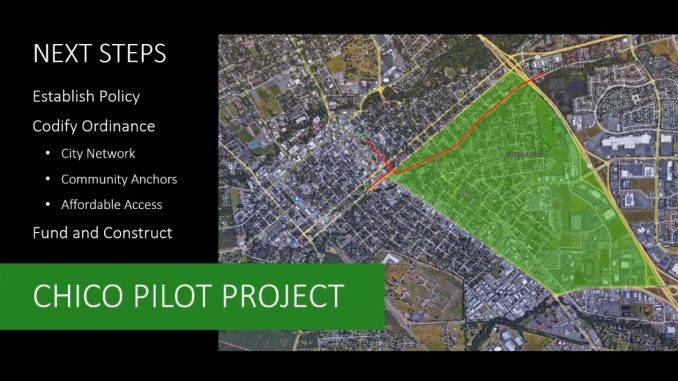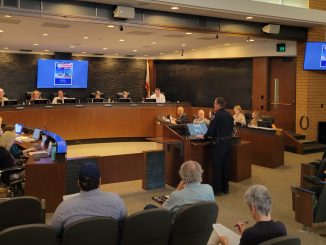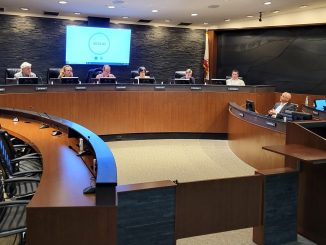
When Scott Dowell began a presentation on broadband to the Chico City Council at its meeting Tuesday night (Jan. 4), (conducted over Zoom due to coronavirus precautions), he projected unbridled excitement. High-speed internet, he said, “can literally revolutionize the future of our city … for potentially up to 50 years.”
Then his connection froze.
“We might have to have this broadband master plan go to your location first,” Mayor Andrew Coolidge quipped to Dowell, the city’s administrative services director, whose signal cut in and out before freezing again. When he returned momentarily, Coolidge asked, “Are you doing this for effect to show that we really need this?”—to which Dowell replied, “I am showing you that we all need this broadband plan.”
Disconnects, digital and political, appeared throughout the meeting. While council members found common ground on broadband and agreed on a settlement for the lawsuit challenging the city’s approach to homelessness, they diverged along partisan lines over an affordable housing policy known as inclusionary zoning.
What Dowell referred to as the city’s “interim master plan” (since details likely will evolve) calls for publicly funded infrastructure for broadband that the city will oversee and make available to any service provider, with the aim of increasing access and decreasing cost via competition.
As a pilot, the city would connect three municipal facilities—the City Hall complex, Fire Station No. 1 on Salem Street and the Public Works/Police Department bend of Humboldt Road—and branch out into the Chapman-Mulberry neighborhoods. Federal funds for COVID-19 recovery would cover the cost. The council had previously dedicated $5 million to broadband, though reallocated $200,000 of those funds to the pallet shelter to go in near Silver Dollar Fairgrounds.
The broadband plan passed on a 7-0 vote.

“We’re definitely moving forward with something tangible, without a doubt,” Coolidge told the CN&R by phone Wednesday morning (Jan. 5). “While it’s a pilot program that covers a pretty good swath of Chico, I think it will continue and make economic sense for it to cover the entirety of Chico within a few years.”
Councilwoman Alex Brown, the lone liberal on the council, supported the conservatives on this use of the funds. Like Coolidge, she pointed out that the federal government included broadband among priorities for the relief funding.
“Using the dollars provided by the federal government to do some good for low-income neighborhoods and address connectivity issues that we face as a rural area is a very positive step in the right direction,” she said by phone Wednesday morning. “[The broadband plan is] innovative, it’s interesting, it’s also very new, there’s a lot of moving parts there, but I’m excited to see where it goes.”
Inclusionary zoning
Brown had the opposite reaction to her counterparts’ action—technically, inaction—on inclusionary zoning. At the previous meeting, she sought to agendize a discussion on this measure, through which municipalities may require builders to dedicate a certain portion of developments to affordable housing. The majority, however, deferred to items already set to come forward: an update of the city’s housing element portion of the general plan this spring and, for Tuesday, recommendations from the Internal Affairs Committee (IAC).
Little discussion ensued. Vice Mayor Kasey Reynolds, who sits on the IAC, relayed that the committee opted against recommending inclusionary zoning because it would be evaluated during the housing element update. Community Development Director Brendan Vieg added that drafting this as a policy would be a “major undertaking,” which he took from the recommendation that his staff “should not be pursuing.” The only public speaker, Jesica Giannola, asked the council to “absolutely reconsider” tabling it.
Prefacing her remarks with, “I can see where this is going,” Brown ripped into the recommendation. She noted a chronic underproduction of affordable housing in the city. She cited evidence of inclusionary zoning’s effectiveness—highlighting its inclusion in the Meriam Park development—and called for a “more active approach” to spurring affordability.
Brown made a motion to reject the IAC’s recommendation and, instead, implement inclusionary zoning in certain developments, including those in the city’s special planning areas. When no one seconded her motion, Councilman Sean Morgan moved to accept the recommendation, Councilwoman Deepika Tandon seconded, and it passed 6-1, with Brown voting “absolutely not.”
Coolidge told the CN&R that he expects deliberations over the housing element to include inclusionary zoning, despite his—and, apparently, counterparts’—opposition to the idea.
“I really don’t think it’s done,” he said.
On that, he and Brown concur.
“The people have the power here,” she said. “Policymakers can make value judgments on various policy opportunities and actions that they might take; but as we saw with cannabis, as we saw with the Climate Action Commission, the people have the power to use their voices and to demonstrate the importance of the policies that affect them.”
Settlement, other actions
In closed session, the council unanimously approved a settlement agreement for the federal lawsuit Warren v. City of Chico. Judge Morrison C. England, Jr., who’s presiding over the case, must sign an order authorizing the terms, which according to the city could take up to two weeks.
“I’m very happy about reaching the end of this road for Chico and what it means for our community,” Coolidge said. “I believe it’s a fair compromise on the issue between something that’s compassionate but something that also restores our parks and waterways.”

The suit dates to last April, when eight plaintiffs represented by Legal Services of Northern California sued to over the city’s anti-homeless ordinances and lack of shelter options. England issued a temporary restraining order, then an injunction, barring enforcement actions such as sweeps of encampments—and subsequently added a gag order preventing public disclosure of negotiations.
With the injunction in place, City Manager Mark Orme told the CN&R, terms cannot be released until England signs the order. Council members likewise could not speak to specifics when commenting on the agreement.
“It was no surprise to me that a legal avenue was pursued when this council took illegal actions against people experiencing homelessness,” Brown said. “It has been a long road that could have been avoided had we listened and planned to address the needs of the unhoused population in Chico earlier on. I am hopeful that what comes next is educational for my colleagues on council and beneficial for not only those who have the least among us but also the community at large.”
Among other actions Tuesday, the council divvied up federal relief funds it set aside for youth programs among four groups—Boys and Girls Clubs of the North Valley ($75,000), Salvation Army ($50,000), Girls on the Run of the North State ($17,201) and North State Composite Mountain Bike Team ($7,999)—plus directed city staff to outline an event to commemorate Chico’s 150th birthday (officially, Jan. 8). Supporting an IAC recommendation regarding a casino downtown, council members decided to consider local card room owner Jon Scott’s requests for a code amendment and use permit once he submits the applications.




People, at least everyday Chico citizens, don’t have a voice in housing development in Chico. City staff have been in bed with developers for years to keep inclusionary zoning off the books. It was actually approved by the “progressive” City Council a few years ago and staff failed to develop a zoning policy because it would never be adopted. Since when is it the staff’s job to go against the Council? Since Fred Davis actually. We, affordable housing advocates, have been trying to get inclusionary zoning implemented since the early 90s to no avail, because developers prevail. The voice of the public has very little effect on what gets passed by the Council. The Council may have adopted the Climate Action Plan but nothing can happen with it without some significant funds to implement it.